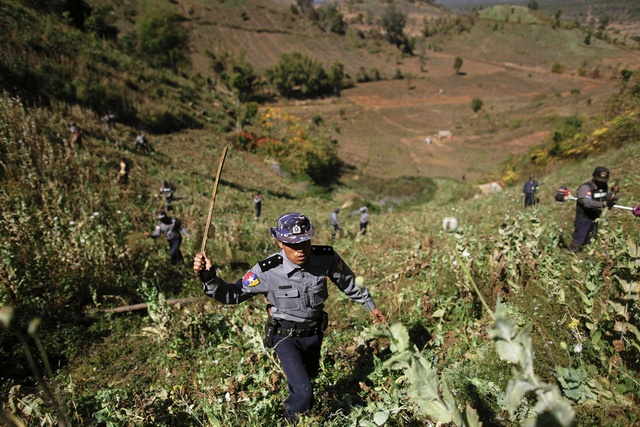Opium production in Burma has risen for the sixth consecutive year, despite a government commitment to eradicate cultivation by 2014, according to a new UN report released on Wednesday.
Production has surged by 17% since last year, mainly in volatile Kachin and Shan states in northern Burma, bringing the number of households growing poppy to 300,000, the latest survey by the UN Office for Drugs and Crime (UNODC) shows.
Poppy cultivation has more than doubled since 2006, rising from 21,600 to 51,000 hectares in 2012, and corresponds to a general rise in opium prices across Southeast Asia.
The upsurge is largely due to an increased demand for poppy locally and across the Asia-Pacific region, says the report. China accounts for over 70% of all heroin users in the region.
However, the issue of land availability for food or alternative crop production is listed as the deciding factor behind a household’s decision to grow poppy.
“Although external drivers probably contribute to the increase in opium cultivation in Myanmar [Burma], of all the elements examined in the survey, land availability is possibly the most important factor behind the continuing existence of opium poppy cultivation in the country,” says the report.
The UN insists that “achievements in reducing the cultivation and production of opium can only be sustained if alternative livelihoods are available to local communities.”
Burma is the second largest opium producer in the world after Afghanistan, responsible for one quarter of the world’s production. In 1999, they launched a controversial 15-year strategy, which committed to eradicate drug production in the country by 2014.
The government has reported the eradication of 23,717 hectares of opium fields in the past year, described by the UN as a “significant reduction” in crops from the preceding year. But it has been criticised for failing to introduce effective crop substitution policies.
Some analysts remain skeptical about the government’s commitment to eradicate poppy. According to Burma expert and editor of the Shan Herald, Khun Hsai, Burma’s drug problem cannot be resolved without reaching a sustainable political resolution with armed ethnic groups.
Government forces continue to clash with rebel forces across Shan state, despite signing tentative ceasefire agreements with the two leading factions of the Shan State Army earlier this year. The Burmese army has been locked in a bloody battle with Kachin rebels in northern Burma since June last year.
“As long as there isn’t a political settlement, they are still enemies, the army needs to increase its friends and cultivate allies among the armed groups who are [fighting] with the rebels,” he told DVB. “Only these armed groups are involved in drugs production and of course the army allows them to be involved.”
He says the army continues to ignore – and tacitly support – the production of poppy in exchange for political capital from militia groups in Burma’s volatile border regions.
Local farmers in southern Shan state, where the government has pledged to eliminate drugs in collaboration with the Shan State Army-South (SSA-S), told the Shan Herald earlier this month that government militias still encourage them to grow poppy.
“It is not the Burma Army and us who are against poppy cultivation. It is Yawdserk [leader of the SSA-S]. Join us and you’ll be protected,” a farmer in Laikha reports being told by a militia member in August.
The UN survey has previously been criticised for relying on government statistics and failing to capture the political elements of Burma’s opium production.



